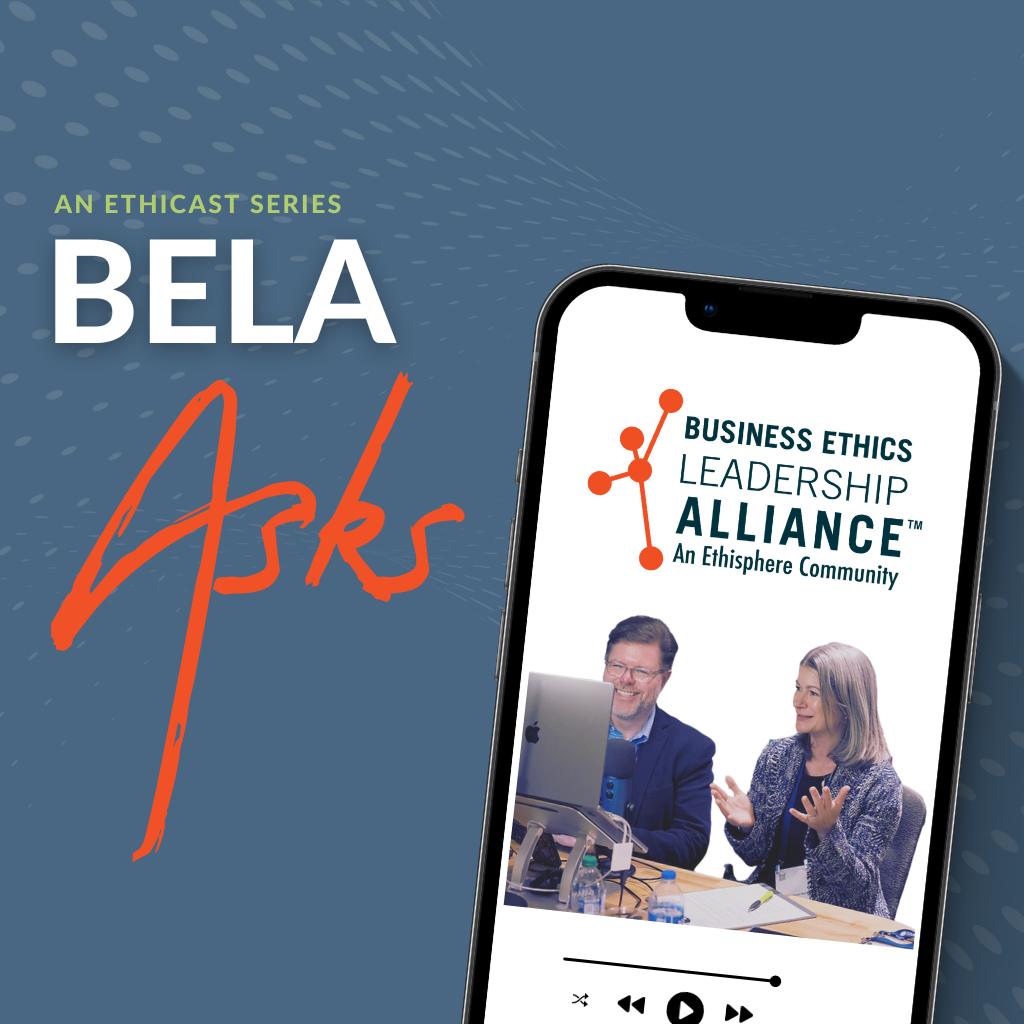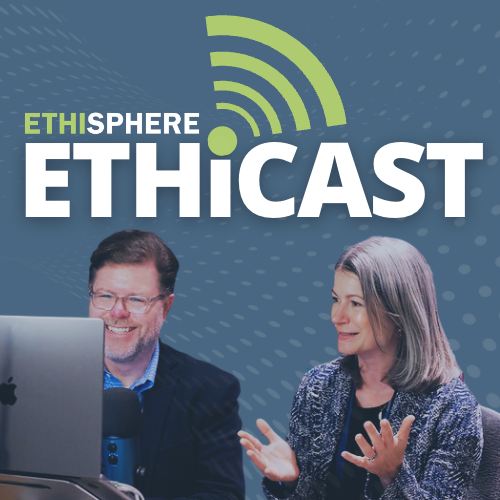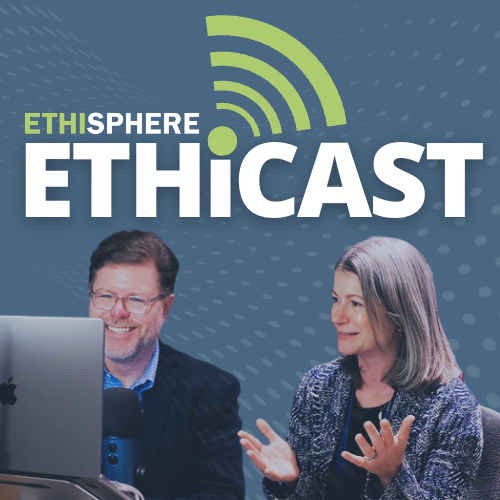[00:00:00] Speaker A: Hi everyone. Today we'll learn about the skills you can develop to better communicate with your team and become a more effective leader. I'm your host, Bill Coffin and this is the Ethicast.
It's tough to be a business leader right now. Last year we saw more CEO churn than ever before and this year businesses are facing one of the least certain and most turbulent operational environments in living memory. The challenge for leaders to build the most value for their organizations has never been more important or more difficult. Robust communication and values based leadership are proven avenues to building better teams and sustainable success. But actually practicing such things remains elusive for many, in part because these are skills that must be learned rather than inherent talents for us to hope that we have. That includes how we communicate with our managers, colleagues and direct reports. And it even includes what we think of as our professional character. Joining us today to talk about these things is Meredith Bell, co founder and president of Grow Strong Leaders. Her company publishes online tools that help leaders strengthen their character and communication skills so they build strong relationships and inspire others to perform at the highest level. Meredith is also the host of the Grow Strong Leaders podcast and her latest books, co authored with her business partner Dr. Dennis Coates, are Connect with your Team, mastering the top 10 communication skills and Peer Coaching Made Simple. Meredith, thank you for joining us today.
[00:01:37] Speaker B: Bill, thank you for having me. I'm really looking forward to this conversation. It's so timely and important for where we're living today.
[00:01:45] Speaker A: Most people think that they are already good at communicating and most people already think that they have strong character. When you are helping professionals become better leaders, how do you contend with folks who are already walking around as if they have nothing to learn?
[00:01:59] Speaker B: You know, I think a key word here is being curious and asking them questions because everyone has areas for improvement. But I think helping to get them to uncover them is an important aspect as opposed to pointing out things to them. So one thing is asking questions to find out a little bit more of what how they see themselves.
Because if they respond with things like, well, that's just how I am or I'm this way and everybody else needs to adapt, that's a clue right there about whether they think they can really change themselves or if they think they're kind of fixed the way they are. So the other kind of questions to ask to me would be around the results they're getting. Are you able to achieve the results you want? And if not, what are the gaps? Oftentimes someone who's not as self aware or is seeing themselves as Having it all together would will tend to cast blame on others. And so that's something to pay attention to and just listen and then respond with what could be different? There are so many different levels we can explore. But asking questions I think is key to helping you to understand where this person is coming from and why they have the perception they do that. The second thing is to encourage the person to get feedback. Because every one of us has blind spots.
We sometimes are very aware of our strengths, but even there we can underestimate what people value in us. So I'm not talking about feedback. That's just to find out what am I doing wrong, but overall, what do you see as my strengths and where am I doing or saying things that are creating problems for you, that I could make changes? I think you could do one on one feedback. Of course, we're a publisher of 360 feedback tools, so there's a formal process that you can go through also which can be very time efficient because you get input from multiple directions, multiple people who interact with you to find out what are your strengths and where would they like to see you make some changes. That to me can be a real eye opener for someone who's not aware of what they are currently, currently doing that may be really benefiting others or creating problems for them.
[00:04:45] Speaker A: Your book connect with your Team notes that the 10 communication skills it covers are not a check the box list, but rather something to develop over a lifetime's worth of personal growth and development. My question to you is for those who really dedicate themselves to this journey of developing their communication skills, are there any mile markers to look for to really know that you're finally starting to get it as a communicator?
[00:05:10] Speaker B: Yeah. That book is very practical focus. Right. And so people can do specific things, whether it's listening, how they give feedback, how they receive feedback. And so one of the ways to determine am I making progress? Is to reflect on each situation where you feel you've been applying that skill and think about how did it go? Did I get the results I wanted? How do I feel about how that went? Did I get someone to respond in a way that helped move us forward in the direction I want us to go? So I think reflecting is a key element there. The other one ties back to the first answer, which is asking for feedback. Marshall Goldsmith has a great phrase that he coined years ago called FeedForward, where you're asking someone, what could I do to get better in whatever it is? And so one of the ways to get practical about this is to simply have one on one conversations. Or even ask your team in a meeting, how am I doing? I've really been focusing on this skill. Let's say it's listening without interrupting or asking more questions or giving more positive feedback. Whatever it is, ask others, how am I doing in this? From your perspective? And then get their suggestions on what you could do to be even more effective. And I think those two things, reflecting after each situation where you've applied it, and then seeking feedback whether it's one on one or even again in a more formal way of 360 feedback to see are people seeing that I'm making progress. So it isn't just my assessment of how I'm doing, it's hearing from others how they see that I'm doing as well.
[00:07:06] Speaker A: Connect with your team's companion volume Growth Strong Character features a really interesting approach to developing effective leaders that rests on a set of 36 character aspects. Can you talk about how you came to develop this approach and how it develops better leaders? And in particular, how? Why should we look at these aspects of our character as skills to develop rather than as fixed attributes?
[00:07:29] Speaker B: Well, first of all, my business partner, Denny Coates and I have been studying character for over 20 years. And one of the things we realized is it is not one thing. And this is a misunderstanding a lot of people have that I've spoken with. They think of character as integrity or character as something that's fixed. You either have it or you don't. In fact, character is made up of many different what we think of as behavior patterns.
These are ways that we talk, ways that we do things that demonstrate whether we are strong or not in a specific aspect of character.
So we think of this related to when we are in situations where we need to do the right thing or the hard thing. And I know your listeners will resonate with that because that's what ethisphere is all about. Both of those doing the right thing and the hard thing. And so those make up aspects of character. There's dozens of them. We narrowed it down to the 36 that we thought were most important in work and had the highest impact. And we organized those in three areas around creating a stronger self, creating a stronger set of relationships, and a stronger work ethic. So we don't see this as fixed. If you think back to Carol Dweck's work on fixed versus growth mindset, we see character, just like communication skills, as being something that can be developed and improved and strengthened over time because it isn't just one thing. We can take an area of self, such as self awareness or humility, or patience or composure or resilience. All of those are aspects of what we call strengthening yourself.
You can look for ways to practice being more patient, for example, in different situations. That's how you can strengthen it over time. It is not helpful for someone to label themselves and say, I'm just an impatient person or I am this or I am that and think that that is how they always have to be. It's a choice, and we can choose to be different in different situations. So we just need to become aware of it and then realize, all right, here are some things that we can I could specifically do. And that's what that book, growthstrong Character is all about. Very specific ideas of how to improve in each one of those 36 areas.
[00:10:16] Speaker A: Your expertise in developing better leadership training is quite deep right now. Everything feels especially topsy turvy in our business world. Given how you have helped so many professionals become strong leaders over the years. What special leadership opportunities does our current moment present, especially to those who have taken seriously the challenge to become better communicators and to become more skillful in their character?
[00:10:41] Speaker B: You know, that's such an important question. And the truth is these are challenging times for us as individuals, as a country, as our companies.
And so we have opportunities every day to practice both the communication skills and the character skills. And I would say in small ways and in large ways, and I'll give you an example of each one in a small way. It might be when you're in a meeting and you've been having a discussion around a specific project or topic, and somebody says something, and it may be somebody that you typically have friction with, but somebody says something that triggers you, and in that moment you have a choice. And that's why I say character and communication skills are skills we develop in the moment as we have opportunities to use them. So what you can apply at that time in terms of character is self awareness.
To be aware that I am feeling triggered, that I'm getting kind of sped up about this, and I'm wanting to react emotionally, But I realize that's not going to serve this person or the meeting for me to do that. And so I also exercise composure where I am committed to staying calm. Then I can also use communication skills like asking questions to prevent myself from reacting emotionally. I can ask a question out of curiosity to learn more about what the person meant, because we make assumptions too, about where somebody's coming from. Or what their intent was and in fact we don't know. And so asking that and then applying the skill of listening to really hear what they're saying to understand so that my response can be more appropriate.
So there are these situations that kind of get escalated with challenges and pressures that we experience in what's going on in the world right now. We just don't know what's happening behind somebody's brain or in their brain or in their lives. And so being willing to be patient and understanding and more compassionate, I think are choices that we have. A larger example that impacts company wide and has implications on both your employees and your customers is this whole issue of dei.
You know, companies have committed to programs over the years and now all of a sudden those are being questioned and in some cases eliminated. So companies that have created these programs and committed to them have a choice about what we're going to do now. And that requires character in terms of being decisive and taking a stand for what we have claimed we believe in and we stand for and then being able to clearly communicate that to all their stakeholders, internal and external. So that's an example of where character and communication come into play big time. And there are consequences, as we've seen, for companies that abandon those programs and principles and those that are taking a stand. And so I think we have opportunities every day, big and small, to apply both character and communication.
[00:14:27] Speaker A: Well, Meredith, thank you so very much for joining us today and for sharing your insights on how we can better communicate and how we can better develop our leadership skills through real mindful intentionality. Thank you so much.
[00:14:38] Speaker B: It's been a pleasure to be with you and I would encourage your listeners to connect with me. I'm very active on LinkedIn so they can just find me there. And I would love to hear what points you got from our conversation that were helpful to you.
[00:14:53] Speaker A: You can get details about Meredith's books, products and
[email protected] While you're there, be sure to check out Meredith's interview with our own Erica Salmon Byrne as they discuss ethics as a business superpower. It's a terrific discussion. Don't miss it. For more resources on cultures of integrity, psychological safety and ethical leadership, check out the Ethisphere Resource center at ethisphere.com resources if you would like to appear as a guest on the ethocast to share a best practice success story or your own proof point around how business integrity builds value, we would love to hear from you. Drop us a
[email protected] ETHACAST thank you for joining us. We hope you've enjoyed the show. For new episodes each week, be sure to subscribe on YouTube, Apple Podcasts and Spotify. And until next time, remember, strong ethics is good business.


